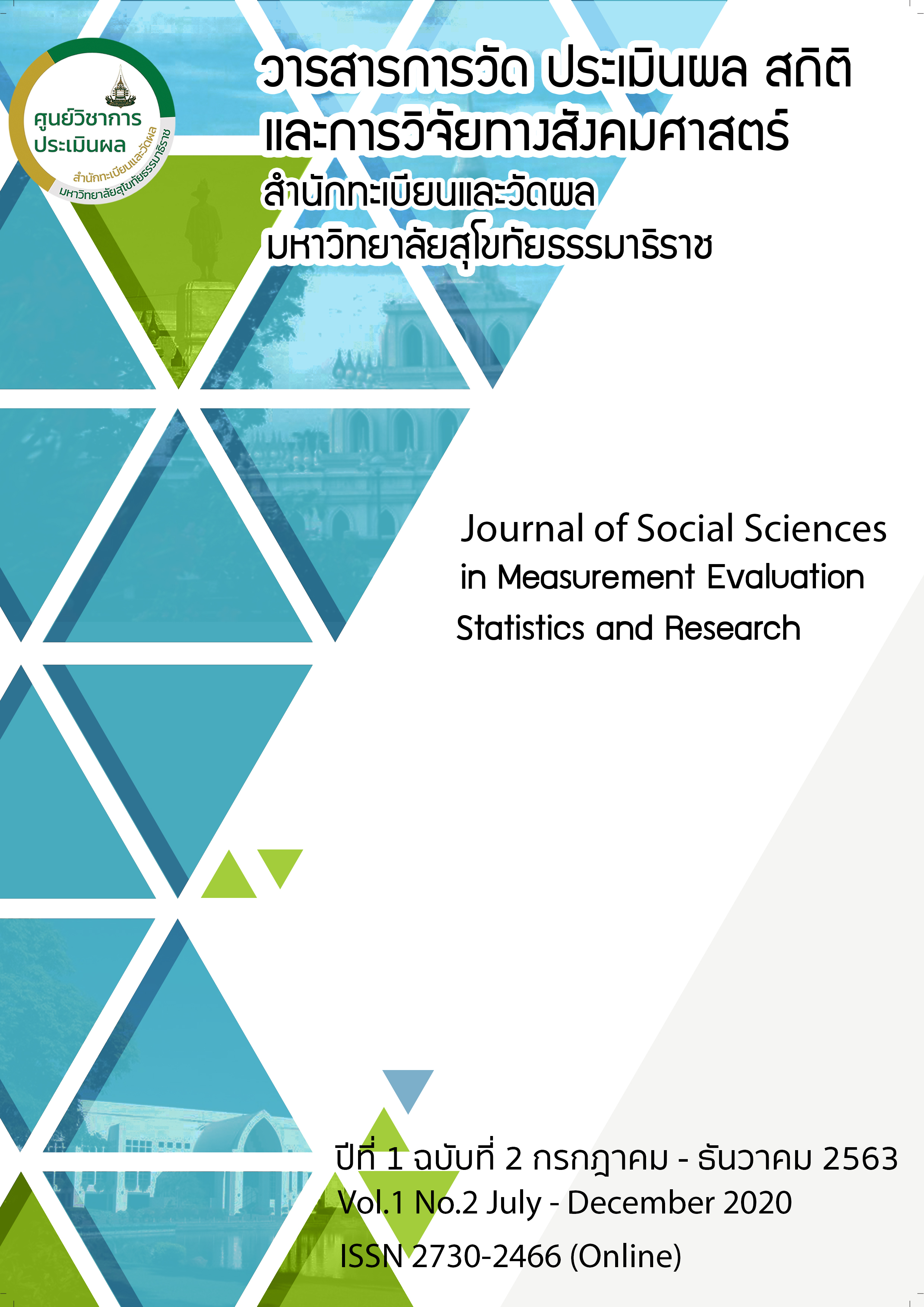การออกแบบแบบปรับเหมาะกับการวิจัยการวัดและประเมินผล
Main Article Content
บทคัดย่อ
ข้อจำกัดของการวัดและประเมินผลที่สำรวจข้อมูลโดยใช้เครื่องมือวัดตามแนวคิดแบบดั้งเดิมที่ไม่ได้คำนึงถึงความแตกต่างของคุณลักษณะเดิมของผู้ถูกประเมินแต่ละคนคือ ต้องใช้ข้อคำถามจำนวนมาก โดยที่ผู้ถูกประเมินทุกคนต้องตอบคำถามครบทุกข้อ ทำให้ผู้ตอบมีอาการเมื่อยล้า ความตั้งใจระหว่างการตอบลดน้อยลง ผู้ตอบให้คำตอบที่ไม่ตรงกับความเป็นจริง มีแนวโน้มที่ผู้ตอบจะยุติการตอบกลางคัน ทำให้อัตราการตอบอยู่ในระดับต่ำกว่าที่ควรจะเป็น (Gardner, & Chua, 2017; Goodman et al., 1992; Krosnick 1999; Zhang, 2000) ส่วนการออกแบบแบบปรับเหมาะ (adaptive design) มีความเชื่อพื้นฐานว่าผู้ถูกประเมินที่มีคุณลักษณะต่างกัน ได้แก่ ความสามารถด้านสติปัญญา อารมณ์ ความรู้สึก ลักษณะนิสัย บุคลิกภาพ รวมถึงพฤติกรรมการตอบแบบสำรวจ ควรได้รับการจัดกระทำจากการสำรวจหรือการประเมินที่ไม่เหมือนกัน (Turnbull, 1951; Cited in Lord,1980; Weiss, 2004; Bethlehem, Cobben, & Schouten, 2011) ดังนั้นบทความนี้จะได้กล่าวถึง มโนทัศน์เบื้องต้นของการออกแบบแบบปรับเหมาะ ประเภทของการออกแบบแบบปรับเหมาะ การออกแบบแบบปรับเหมาะโดยใช้คอมพิวเตอร์ (computerized adaptive design) การสำรวจแบบปรับเหมาะโดยใช้คอมพิวเตอร์ (computerized adaptive survey -- CAS) และบทสรุปการออกแบบแบบปรับเหมาะประเภทต่าง ๆ ที่สามารถนำไปใช้สำหรับการวิจัย การวัดและประเมินผล
Article Details

อนุญาตภายใต้เงื่อนไข Creative Commons Attribution-NonCommercial-NoDerivatives 4.0 International License.
ข้อความและบทความในวารสารการวัด ประเมินผล สถิติ และการวิจัยทางสังคมศาสตร์ เป็นแนวคิดของผู้เขียน มิใช่ความคิดเห็นของกองบรรณาธิการวารสาร จึงมิใช่ความรับผิดชอบของวารสารการวัด ประเมินผล สถิติ และการวิจัยทางสังคมศาสตร์ บทความในวารสารต้องไม่เคยตีพิมพ์ที่ใดมาก่อน และสงวนสิทธิ์ตามกฎหมายไทย การจะนำไปเผยแพร่ ต้องได้รับอนุญาตเป็นลายลักษณ์อักษรจากกองบรรณาธิการ
เอกสารอ้างอิง
ศิริชัย กาญจนวาสี. (2555). ทฤษฎีการทดสอบแนวใหม่ (พิมพ์ครั้งที่ 4). กรุงเทพฯ: จุฬาลงกรณ์มหาวิทยาลัย.
สถาบันส่งเสริมการสอนวิทยาศาสตร์และเทคโนโลยี กระทรวงศึกษาธิการ. (2557). ผลการประเมิน PISA 2012 คณิตศาสตร์
การอ่าน และวิทยาศาสตร์นักเรียนรู้อะไร และทำาอะไรได้บ้าง. กรุงเทพฯ : โครงการ PISA ประเทศไทย สถาบันส่งเสริมการสอนวิทยาศาสตร์และเทคโนโลยี.
สมเกียรติ แก้วเกาะสะบ้า ชยุตม์ ภิรมย์สมบัติ และสุวิมล ว่องวาณิช. (2563). แนวทางการเสริมสร้างสมรรถนะการวิจัยทางการศึกษาในยุคดิจิทัลสำหรับผู้เรียนระดับบัณฑิตศึกษา: การประยุกต์แนวคิดการออกแบบแบบปรับเหมาะ. วารสารวิธีวิทยาการวิจัย, 33(1).
Bethlehem, J.G., Cobben, F., & Schouten, B. (2011). Handbook of nonresponse in household surveys. John Wiley & Sons, Hoboken, NJ, USA.
Calinescu, M., Schouten, B., & Bhulai, S. (2012). Adaptive survey designs that minimize nonresponse and measurement risk. Discussion paper 201224, CBS, Den Haag.
Chua, Y. P., & Don, Z. M. (2013). Effects of computer-based educational achievement test on test performance and test takers’ motivation. Computers in Human Behavior, 29(5), 1889-1895.
Claudia Flowers, C., Kim, D. H., Lewis, P., & Davis, V. C. (2011). A Comparison of computer-based testing and pencil-and-paper Testing for Students with a Read-aloud Accommodation. JSET 2011, 26(1), 1-12.
Goodman, J. A., Broetzmann, S. M., & Adamson, C. (1992). Ineffective - That’s the Problem with Customer Satisfaction Surveys. Quality Progress, 25(5), 35–38.
Groves, R. M., Heeringa, S. G. (2006). Responsive design for household surveys: tools for actively controlling survey errors and costs. Journal of the Royal Statistical Society: Series A. 169, 439 – 457.
Hayes, B. E. (1992). Measuring Customer Satisfaction, Milwaukee, WI: ASQC Quality Press.
Hol, A. M., Vorst, H. C. M., & Mellenbergh, G. J. (2008). Computerized Adaptive Testing of Personality Traits. Journal of Psychology, (216:1), pp. 12–21.
Hwang, G. J., & Chang, H. F. (2011). A formative assessment-based mobile learning approach to improving the learning attitudes and achievements of students. Computers & Education, 56(4), 1023-1031.
Hwang, G. J., Wu, P. H., Zhuang, Y. Y., & Huang, Y. M. (2013). Effects of the inquiry-based mobile learning model on the cognitive load and learning achievement of students. Interactive learning environments, 21(4), 338-354.
Krosnick, J. A. (1991). Response Strategies for Coping with the Cognitive Demands of Attitude Measures in Surveys. Applied Cognitive Psychology, 5(3), 213–236.
Krosnick, J. A. (1999). Survey research. Annual Review of Psychology, 50, 537–67.
Lord, F. M. (1980). Applications of item response theory to practical testing problems. Applied Psychological Measurement (Vol. 5). Hillsdale, N.J.: L. Erlbaum Associates.
Manfreda, K. L. M., Batagelj, Z., & Vehovar, V. (2002). Design of Web survey Questionnaires: Three Basic Experiments. Journal of Computer-Mediated Communication, 7(3), 10.
Merrell, C., & Tymms, P. (2007). Identifying reading problems with computer-adaptive assessments. Journal of Computer Assisted Learning, 23, 27–35.
Nikou, S. A., & Economides, A. A. (2016). The impact of paper-based, computer-based and mobile-based self-assessment on students’ science motivation and achievement. Computers in Human Behavior, 55, 1241–1248.
OECD. (2013). Transferable skills training for researchers-supporting career. Development World Science Forum, 24-27 November 2013, Rio.
Peytchev, A. (2013). Interactive case management. Workshop on advance in Adaptive and responsive designs. Heelan. The Natherland.
Sabbaghan, S., Gardner, L. A., & Chua, C. E. H. (2017). Computer-Adaptive Surveys (CAS) as a Means of Answering Questions of Why. PACIS 2017 Proceedings. AIS Electronic Library (AISe).
Schouten, B., Calinescu, M., & Luiten, A. (2013). Optimizing Quality of Response through Adaptive Survey Designs. Survey Methodology, 39 (1), 29–58.
Schouten, B., Peytchev, A., & Wagner, J. (2017). Adaptive survey design. CRC Press Taylor & Francis Group. Boca Raton London New York.
Thompson, N., & Weiss, D. (2011). A framework for the development of computerized adaptive tests. Practical Assessment, Research & Education 16(1). Retrieved from http://www.pareonline.net/pdf/v16n1.pdf
Tourangeau, R., Brick, J. M., Lohr, S., & Li, J. (2017). Adaptive and responsive survey designs: a review and assessment. J. R. Statist. Soc. A. 180. 203–223.
Wagner, J. (2013). Adaptive contact strategies in telephone and face-to-face surveys. Survey Research Methods, 7(1), 45-55.
Walker, J., Böhnke, J. R., Cerny, T., & Strasser, F. (2010). Development of symptom assessments utilising item response theory and computer-adaptive testing -- A practical method based on a systematic review. Oncology/Hematology, 73 47–67.
Weiss, D. J. (2004). Computerized adaptive testing for effective and efficient measurement in counseling and education. Measurement and Evaluation in Counseling and Development, 37(2), 70.
Zhang, Y. (2000). Using the Internet for survey research: A case study. Journal of the
American Society for Information Science, 51(1), 57.


